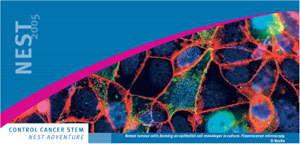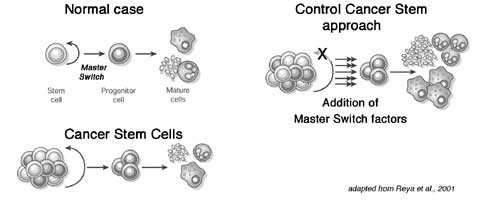Introduction
 The
recent discovery of human embryonic stem cells and of multipotent
adult progenitor cells, which can be experimentally led to differentiate
into a wide range of cell types has strongly increased the interest
in stem cell biology. It is only recently that a clear link
has been established between stem cells and cancer in a variety
of tumour types since tumours often arise from the transformation
of normal stem cells. Moreover it has been
shown in several instances that solid tumours contain a small
proportion of cancer stem cells (CSCs) and that these CSCs are
responsible for the tumour phenotype. The proliferative, self-renewal
and differentiation properties of these CSCs are reminiscent
of normal stem cells, suggesting that they may behave similarly
when placed in presence of the same signals.
The
recent discovery of human embryonic stem cells and of multipotent
adult progenitor cells, which can be experimentally led to differentiate
into a wide range of cell types has strongly increased the interest
in stem cell biology. It is only recently that a clear link
has been established between stem cells and cancer in a variety
of tumour types since tumours often arise from the transformation
of normal stem cells. Moreover it has been
shown in several instances that solid tumours contain a small
proportion of cancer stem cells (CSCs) and that these CSCs are
responsible for the tumour phenotype. The proliferative, self-renewal
and differentiation properties of these CSCs are reminiscent
of normal stem cells, suggesting that they may behave similarly
when placed in presence of the same signals.
To our knowledge, only a few studies have been focused on CSCs.
Notably, Singh and collaborators (2003) and Hemmati and collaborators
(2003) have isolated and characterized brain tumour stem cells
from medulloblastoma, ganglioglioma, astrocytoma and ependymoma
tumours isolated from children. A recent review also discusses
the presence of stem cells in brain tumours (Oliver and Wechsler-Reya,
2004).
In another type of approach, van de Wetering and co-workers
(2002) in H. Clevers’s lab have demonstrated that by turning
off the Wnt signalling pathway, which is constitutively active
in colorectal cancer cells, they could trigger in vitro the differentiation
of the transformed colon cancer cells into differentiated, non-proliferative,
colonic cell types.
This shows that the Wnt signal is a Master
Switch for the control of colon cancer and that it is possible
to knock cancer cells off their proliferative “vicious” circle
and trigger their differentiation leading to a non-cancerous
phenotype.
Brain Cancer Stem Cells & Differentiation Factors
We
propose to investigate CSCs and to identify and use the Master
Switch factors responsible for the choice between proliferation
and differentiation. We hope that this will lead to a change
of paradigm in the treatment of cancers. The proposed approach
is illustrated below:

We are presently carrying research to be able:
-
To generate and
isolate cancer stem cells from human brain tumours
-
To identify
the secreted Switch factors required for the differentiation
of these cancer stem cells
-
To differentiate efficiently these
stem cells into post-mitotic
neurons
and glial cells by the addition of a Switch factor or a
combination thereof.
-
To differentiate in vitro tumourspheres derived from CSCs
Biomarkers for brain Cancer Stem Cells
Development of new diagnostic and prognosis tools for human glioblastoma cancer stem cells
It has been recently shown that cancer is frequently a stem cell disorder in which uncontrolled proliferation of cancer stem cells (also called Brain Tumour Initiating Cells, BTICs) is at the origin of tumor growth and development.

We aim at identifying and visualizing the cancer stem cells present at low frequency in brain tumors. To achieve this aim, we will generate single-domain antibody fragments recognizing a known brain cancer stem cell biomarker (CD133).
These will be used to detect with a high specificity the presence of cancer stem cells in brain tumors and biopsies isolated during surgical treatment. This technique may be extended to other tumors characterized by the expression of the same biomarker (ovarian, liver and gastric cancers).
This should lead to the development of diagnostic and prognosis tools that will be used to improve the treatment of the cancer patients. The initial target group is patients with glioblastoma brain tumors that represent about 50% of all brain tumors and are found in 2 to 3 cases per 100 000 persons.
This project is financed by the Fournier-Majoie Foundation (see website: FFMI).

Up